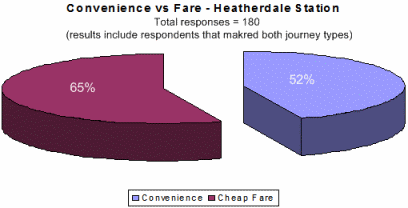Accompanying my verbal report on the CEDA conference, I also tabled the following written report in conjunction with my delegates’ report:
CEDA on Peak Oil
Attended Monday 28th August 2006
Location: Zinc at Federation Square
Seminar cost: $187
Introduction:
CEDA is a not-for-profit independent think tank that aims to promote Australia’s economic development in a sustainable and socially balanced way. CEDA holds regular briefing lunches on issues relevant to their scope.
As a result CEDA in conjunction with the Australian Society of Peak Oil (ASPO) organised Chris Skrebowski, a leading oil analyst, to discuss the reasons behind rising oil and rising petrol prices
The issues raised are directly relevant to Maroondah City Council as identified within the Maroondah Integrated Transport Strategy of 2006 and Council Plan which seek public transport improvements for the municipality.
Content:
Chirs Skrebowski spoke about peak oil, which is when global oil production begins an inevitable decline because new oil fields cannot offset declining production from ageing fields ultimately resulting in rising petrol prices as the supply of oil becomes more and more scarce.
The concept of peak oil is not new; it was first suggested in 1956 by American geophysicist Marion King Hubbert who despite being criticised at the time successfully the year that oil production in the United States would peak.
In recent years the debate surrounding peak oil has shifted from being a question of if to when. There is now general consensus that peak oil is real and will occur generally sooner rather than later.
Chirs Skrebowski’s research, as well as several other leading commentators, suggested that the production of oil will peak at the very latest in 2010, or possibly even earlier depending on the true state of oil reserves in the Middle East. In recent years there has been a shortfall between the consumption and production of oil and this gap is excepted to widen significantly after 2010, where the cost of oil and hence the cost of petrol will rapidly increase.
The conference made it clear that there is no ‘magic bullet’ solution to peak oil since no single alternative exists to simply replace our dependence on oil. For example, simply replacing our dependence on oil with biodiesels, such as ethanol, would require all land used for agricultural within the world, obviously leaving nothing available for the harvesting of food. Hydrogen, another potential replacement for oil, requires more energy to produce than it actually provides as a fuel making the mass usage of hydrogen incredibly inefficient and raising issues in regard to global warming.
Local Context:
Individuals and families are doing it tough with rising petrol prices eating into budgets and this will ultimately affect our economy as people spend less due to the rising cost of petrol.
This will of have serious repercussions for Maroondah as a largely car dependant outer eastern municipality in Melbourne.
Ringwood, which has been identified as a Transit City, and Croydon, earmarked as an Activity Centre, are planned to undergo increased urban densities and mixed use development in an attempt to locate residents close to employment, recreation and educational opportunities. This form of urban development, known as New Urbanism, is being touted as a planning methodology that is able to partly mitigate the need for car dependence.
This is consistent with local planning policies and the State framework as identified within Melbourne 2030.
Ultimately however rising petrol prices and the advent of peak oil will affect the very concepts of transportation and mobility. With cars being one of the major users of oil it is clear that an alternative to excessive car dependence is required and this will require the increased provision of public transport to municipalities such as Maroondah.
The State Government’s Bus Plan clearly stated that a fifteen-minute frequency for direct bus services along Melbourne’s major roads was required to encourage a modal shift towards public transport and to provide service levels comparable with the tram network. This was consistent with the plans developed for the Outer Eastern Public Transport Plan that was developed by the State Government in consultation with the eastern municipalities.
Currently the State Government has committed itself to delivering little more than minimum service levels of an hourly frequency for Melbourne’s outer suburbs, including Maroondah, demonstrating that continued advocacy for public transport is required.
Conclusion:
While debate still surrounds peak oil, it is increasingly becoming obvious that the thinking of old, of cheap and never-ending oil is a relic of the very dinosaurs that were fossilized to create the very fuels we have blindly grown dependent upon.
Maroondah through its involvement within the Eastern Transport Coalition and in its Integrated Transport Strategy has the capabilities to continue advocating for improved public transport to ensure that an alternative to rising petrol prices exists for the people of Maroondah.
